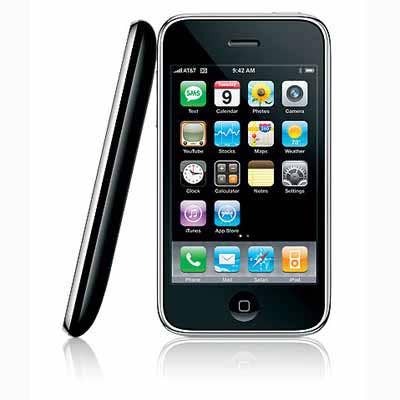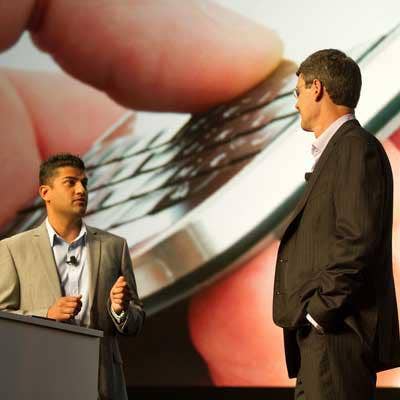8 Factors That Led To RIM's Fall

Where It Started Going Downhill
As Research In Motion's share of the mobile market continues to dwindle, analysts, consumers and partners alike have opinions as to what has contributed to the former industry giant's downward spiral. Whether it's a poor showing of applications, a vast underestimation of Apple's impact on the smartphone market, or product delays that have prompted even the biggest BlackBerry loyalists to jump ship, techies around the globe are theorizing about what caused RIM to go wrong.
Here's a look at eight of the most widely believed factors that have brought RIM's BlackBerry empire to a halt.

An Unusual Governance Model
Over the course of their 15-year run as co-CEOs and co-chairmen of RIM, Mike Lazaridis and Jim Balsillie grew the Waterloo, Ontario-based company into a tech behemoth in the mid-2000s.
But some also argue that they were one of the biggest contributors to the BlackBerry's steady demise. Even today, after Lazaridis and Balsillie have resigned from their roles, governance experts point to RIM's longtime management structure as one of the things that has hurt it most. They argue that the co-CEO/co-chairmen model confined virtually all decision-making to the hands of Lazaridis and Balsilile, making it impossible for RIM's board to have a voice of its own -- or reverse the BlackBerry's downward spiral.
"If the chair is the leader of the board, how can you have a CEO reporting and being accountable to himself?" asked Garfield Emerson, a Toronto-based lawyer and governance guru, in an interview with CRN.

The Apple iPhone
In September 2007, Apple took the smartphone industry by storm with the launch of its first-generation iPhone. A strangely buttonless screen and sophisticated Web browsing experience eventually would make the iPhone one of the best-selling products in Apple's portfolio -- but RIM simply didn't see it coming.
RIM's lackluster reaction to the iPhone is often cited as one of its biggest blunders. Investors and former employees alike felt RIM severely underestimated the significance of the iPhone, along with the importance of winning over the consumer market.
In all fairness, RIM wasn't the only smartphone maker to scoff at the first iPhone. Microsoft CEO Steve Ballmer famously said in an interview that there was "no chance that the iPhone is going to get any significant market share."

Not Realizing Apps Are Where It's At
Accessibility to applications -- and lots of them -- has become one of the biggest drivers behind smartphone adoption. So even though RIM's latest BlackBerry devices tout some sleek-looking designs, users might not be interested, knowing the number of supported apps pales in comparison to those supported by iOS- and Android-based devices.
RIM is working to grow its app count for its upcoming BlackBerry 10 software, but its portfolio still trails significantly behind competitors Apple and Google, whose app stores boast nearly 617,000 and 363,000 apps, respectively. RIM's BlackBerry App World, by comparison, has 142,000 apps, according to mobile research firm Mobilewalla.

The PlayBook's Uphill Battle
When the BlackBerry PlayBook launched in fall 2010, it was met with mixed reviews. While it was a durable, sleek-looking gadget, its app offering seemed miniscule compared to Android-based tablets or the iPad and some of the swiping navigation seemed less intuitive. What's more, the PlayBook lacked native email and calendar apps, requiring users to import them manually from their BlackBerry smartphones.
In December 2011, RIM took a $485 million pre-tax provision charge for sitting on a large inventory of unsold PlayBooks and, despite the launch of a new operating system in 2012 that filled some of the gaps discovered in the first-gen version, the tablet simply never gained the traction it needed to become a serious contender in the mobile market.
The 32-GB and 64-GB PlayBooks are still available today, but the 16-GB version was officially discontinued in June.

The Anonymous Letters
In June 2011, Boy Genius Report published a letter it received from an anonymous (and clearly disgruntled) RIM employee, addressed directly to then-CEOs Lazaridis and Balsillie. Not only did the letter-writer beg for a greater emphasis to be placed on marketing and app development for RIM's struggling line of BlackBerry smartphones, but also revealed what appeared to be a harsh corporate culture in which employees feared speaking up.
"We should also address issues surrounding making RIM an enjoyable workplace," the letter read. "Some of our offices feel like Soviet-era government workplaces."
Two additional letters surfaced after this one, also exposing instances of low employee morale and poor leadership at RIM. Though they may not have had a direct impact on the company's bottom line, these letters didn't exactly make for the glowing public image RIM could have used to turn things around.

Lights Out
All smartphone users know the frustration of losing service and not being able to place a call. And, unfortunately for RIM, this was an all-too-familiar feeling for millions of its customers last October, when a massive BlackBerry service outage ran rampant across the globe.
Angry customers in the U.S. and Canada -- some of whom lost service for up to four days -- grew even angrier when RIM offered free premium apps and technical support to make up for the inconvenience, a peace offering they found inadequate. Customers filed two class-action lawsuits against the BlackBerry maker, seeking financial damages instead of apps, and the BlackBerry brand was dealt yet another blow.

Not On-Boarding A Fresh Set Of Eyes
When Lazaridis and Balsillie revealed in January that they were stepping down from their roles as co-CEOs and passing the torch to current CEO Thorsten Heins (pictured), it was music to the ears of several RIM investors who had been pushing for change.
But Heins, who acted as RIM's COO for more than four years before taking over for Lazaridis and Balisillie, didn't offer the outsider's perspective many felt RIM needed to turn things around. Heins came under fire just days after his appointment for saying he didn't think any "seismic changes" were needed at RIM, leaving some to question whether he truly understood just how beleaguered the BlackBerry brand had become.
"Well, after seeing his videos up on the RIM YouTube site, I get the impression he's already been there too long. He's been there four years already, I believe," said Tim Shea, a Millbury, Mass.-based solution provider, upon Heins' appointment. "He still sees RIM as a market leader, when they're obviously not."

BlackBerry 10 Delay
Since his appointment as CEO, Heins has made RIM's upcoming BlackBerry 10 software the focal point. So when he disclosed during RIM's first-quarter earnings call in June that launching the software this year, as originally planned, was "no longer realistic," the hearts of BlackBerry loyalists -- and partners -- sank. Partners doubted their RIM customers would want to wait another six months for the BlackBerry 10 update, especially since the mobile market would be even more saturated with the arrival of new devices, including the iPhone 5.
"I would consider myself [RIM's] biggest fan, personally, but waiting years for a new phone is just not in my plans," said Robby Hill, a BlackBerry user and owner of HillSouth, a Florence, S.C.-based RIM solution provider. "Holding out until the end of this calendar year seemed like an eternity already."
When BlackBerry 10 does come to market, it will arm BlackBerry smartphones with new features, including touch-screen keyboards and a bigger app ecosytem.